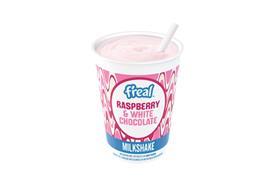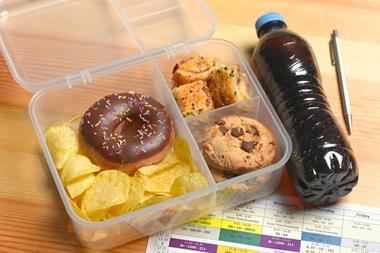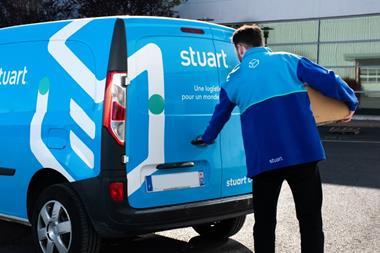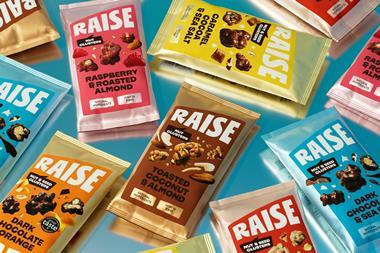According to TNS data (12 months to May 2009), 45 billion cups of tea and coffee were consumed in the home in the past year. No doubt some of this year's tally will be being enjoyed while reading this feature.
Obviously most of what is being drunk by the general population will have been bought at one of the major multiples, however a fair bit will have been purchased at shoppers' local c-store.
According to IRI convenience channel data (52 weeks ending July 11, 2009) hot beverages are worth £182m to c-stores, which is up 3.1% on the previous year. We're now a nation of coffee drinkers with instant coffee accounting for 47% of sales, worth £86m and up 5.6%, while tea trails slightly behind with a 38% share, worth £69m and down 0.5%. Perhaps surprisingly, hot choc has 6% of the market and is worth just over £10m, with sales up 8.3%. This beats roast and ground coffee which claims 5% of the market and is worth less than £10m. However, it's showing healthy growth with a 6% rise. Malted drinks aren't faring so well with 1.7% of the market, worth £3m and down 11.9%. Fruit and herbal teas have an equally small proportion of the market and are worth the same as malted but are up 11.8%. Finally, while green tea is a small player with 0.4% of the market and worth £800,000, it is showing fantastic growth up by 20.6%.
In convenience stores Nescafé is the king of coffees and Original 100g is the best-seller. Nestlé trade communications manager Graham Walker says: "Within instant coffee, regular lines like Nescafé Original and premium products like Gold Blend account for three-quarters of the market and are the ones convenience stores should focus on.
"However once you've got those sectors nailed you can develop others. Café-style coffees like Nescafé cappuccino and latte in sachets are selling well. They are worth £8.5m through convenience stores with sales up 18% (IRI source as before)."
He reckons it's cash-strapped shoppers who are using high street coffee shops less who are driving those sales as they try to replicate the coffee shop experience at home.
According to TNS Worldpanel figures for winter 2008/09, coffee consumption in the home has increased by 8% while out of home consumption has shrunk by 2.3%.
Another sector to think about is super premium because it is doing really well in c-stores, with 27% growth and currently worth £4m. For example, sales of Alta Rica in c-stores are up 41%, something Walker puts down to increased distribution.
"Despite the economic downturn, premium remains an important trend because of its superior taste benefits," he says.
Louise Stigant, commercial director of convenience at Kraft Foods UK, reckons consumers are interested in sustainability, too. She says this makes Kenco freeze-dried coffee a good choice for c-stores.
Kraft Foods now sources 75% of the beans for its Kenco freeze-dried coffee range from Rainforest Alliance-certified farms, and is aiming to buy all beans from them by next year.
"Our work with the Rainforest Alliance helps to ensure a better quality of life for coffee farming communities, and helps protect the environment and the wildlife that depend on it. Kenco is one of the first premium coffee brands to have such strong ethical credentials and it's an important message to carry through to customers," she says.
According to Nielsen data, sales of Fairtrade hot beverages are showing value growth of 8.3%. However, Jon Marlow, head of sales at Cafédirect, says c-store retailers have been slower to respond to this growth potential.
"We would like to see c-stores work harder on their ethical offering and partner with strong, well-known brands such as Cafédirect," he says.
"We know that the ethical consumer tends to have a greater disposable income. These shoppers are not just price driven, but interested in values such as provenance and the livelihoods of the farmers and they will pay extra for that reassurance. If they can't get Fairtrade in their local store there is a strong chance that they will shop elsewhere."
He recommends, as a minimum, merchandising a Fairtrade alternative alongside standard hot drinks. This means offering a recognised Fairtrade brand of instant coffee, roast & ground coffee and tea bags.
Joe Hale, account director at brand consultancy Dragon Rouge, reckons there will be a continued push towards ethical products as long as it's not at the compromise of quality. "Consumers don't want to lose good taste in return for a good conscience," he says.
He also believes Fairtrade will become the standard. "As we have seen recently in the confectionery market, a commitment to ethical ideals is more a case of good business than it is of effective marketing. We've reached the tipping point on this now and we would expect to see brands committing to Fairtrade or equivalent practices across their portfolio, not just within a niche or range."
When it comes to tea, Tetley GB customer marketing controller Simon Attfield reckons the product needs to be more visible in c-stores. "Tea is very much a planned top-up purchase in the convenience environment. It is a staple of daily life people will go out and get it if they have run out. But unless you hunt it out you won't find it it needs better visibility in c-stores."
Attfield says tea buyers are valuable customers, and he's right. HIM Convenience Tracking Programme research has found that tea shoppers will typically have a basket of goods worth more than £10 because they buy other products as well. It's a similar story for coffee buyers.
"If you have a true grocery offer and you get it right, people will spend a lot of money in your shop," says Attfield.
Lots of c-stores just stick to black tea but there are other teas to consider such as decaf, green, redbush or infusions. "Retailers adding another black tea to their range might need to ask themselves: how different is it to what I already stock?" he continues.
Attfield reckons 80s is the core size, but says it does depend on your shopper. "If you have a lot of older customers who come on foot then you should have 40s, or if you are in a transient area where customers come by car you could go up to 160s. A typical family would get through 160 teabags in a couple of weeks."
And ranging can vary at different times of year. For instance, health is a key driver in January when loads of consumers are either on diets or on a healthy eating kick. "That's when you need your green and decaf teas and maybe a redbush on your aisle ends and on promotion," recommends Attfield.
Neil Manders, UK sales director at Twinings, would also like to see c-store shoppers offered a wider choice of teas. "Many retailers offer the mainstream teas and little in the way of premium teas. I'd like to see them extend the choice to include speciality teas, infusions and green teas," he says.
The company is investing heavily in its 'Discover the Art of Tea' campaign in a bid to educate consumers about different teas.
Manders adds that health is still a key sales driver so he recommends c-stores stock a green tea. Twinings Pure Green Light & Delicate might be the answer as Manders describes it as an "easier entry point into the category for non-green tea consumers".
For any retailer wishing to stock more fruit and herbal teas, there are plenty to choose from.
According to Unilever, its Lipton Fruit & Herbal Infusions range has gone down well with consumers. It was launched to appeal to younger consumers and its Drink Gorgeous advertising featuring strawberry and peppermint lips has captured their imaginations.
There are seven teas in the range split into three segments: destination Morocco, which is mint, spices & orange zest; Alps which is mint & eucalyptus; and Andalucia which is citrus fruit & orange blossom; fruity red fruit and warming lemon & ginger; and herbal crushed peppermint and sunny camomile.
Meanwhile, a premium brand with a growing presence in the market is Dr Stuarts Botanical Teas, which has just launched a new identity. The new design is said to give the product "a fresh and completely different look".
Keith Garden, managing director of Dr Stuart's brand owner Only Natural Products, says: "Having built the brand's success on the quality of the herbs we insisted on using, we were finding phrases like 'Pharmacopoeial Grade DAB 10 herbal' extracts a bit of a mouthful to explain to customers. We also felt that, even though we'd enjoyed consistent growth and built up a staunch following, it was time for a completely new look to set the brand apart from the mainstream."
A series of different illustrations and descriptive quips on each blend is designed to draw the eye to the herbs inside. A new leaf motif 'Active Botanicals' has been placed on the front of each pack as a "seal of quality" for the consumer. There is also a new Dr Stuart's logo and the range has been colour coded into four categories herbal, fruit, functional and green teas to aid identification.
Alongside the redesign come three new arrivals: a wild nettle tea and two new additions to the functional range liver detox and throat relief.
Finally, no hot beverages fixture would be complete without hot chocolate and for many consumers the only hot chocolate they'll even contemplate buying is Cadbury's.
Alongside its standard hot chocolate, Cadbury offers Highlights low-calorie drinking chocolate, which was relaunched this year with a new recipe and packaging design.
The new recipe is said to have an even 'more chocolatey taste'. This is because research found that consumers are treating low calorie hot beverages as a chocolate substitute. The packaging is predominantly brown to reflect this. The relaunch also saw the café latte and fudge variants renamed as chocolate mocha and chocolate fudge.
Cadbury has identified two growth opportunities for its hot chocolate. The first is to appeal to a younger shopper from age 25 plus in addition to existing shoppers. The second is to drive frequency of purchase. The company reckons this can be achieved by ensuring leading hot chocolate brands such as Cadbury are always available in store, so that consumers can find the product they want immediately.
Another hot chocolate brand that's doing well is Galaxy. Carys Delve, category marketing manager (hot drinks) at Aimia Foods reckons the huge awareness of the brand can be used to help drive sales.
"Whether customers are choosing a cup of hot chocolate to enjoy as part of some 'me time', or as an alternative to tea and coffee, it is important that convenience store operators are able to offer products that meet these needs."
Obviously most of what is being drunk by the general population will have been bought at one of the major multiples, however a fair bit will have been purchased at shoppers' local c-store.
According to IRI convenience channel data (52 weeks ending July 11, 2009) hot beverages are worth £182m to c-stores, which is up 3.1% on the previous year. We're now a nation of coffee drinkers with instant coffee accounting for 47% of sales, worth £86m and up 5.6%, while tea trails slightly behind with a 38% share, worth £69m and down 0.5%. Perhaps surprisingly, hot choc has 6% of the market and is worth just over £10m, with sales up 8.3%. This beats roast and ground coffee which claims 5% of the market and is worth less than £10m. However, it's showing healthy growth with a 6% rise. Malted drinks aren't faring so well with 1.7% of the market, worth £3m and down 11.9%. Fruit and herbal teas have an equally small proportion of the market and are worth the same as malted but are up 11.8%. Finally, while green tea is a small player with 0.4% of the market and worth £800,000, it is showing fantastic growth up by 20.6%.
In convenience stores Nescafé is the king of coffees and Original 100g is the best-seller. Nestlé trade communications manager Graham Walker says: "Within instant coffee, regular lines like Nescafé Original and premium products like Gold Blend account for three-quarters of the market and are the ones convenience stores should focus on.
"However once you've got those sectors nailed you can develop others. Café-style coffees like Nescafé cappuccino and latte in sachets are selling well. They are worth £8.5m through convenience stores with sales up 18% (IRI source as before)."
He reckons it's cash-strapped shoppers who are using high street coffee shops less who are driving those sales as they try to replicate the coffee shop experience at home.
According to TNS Worldpanel figures for winter 2008/09, coffee consumption in the home has increased by 8% while out of home consumption has shrunk by 2.3%.
Another sector to think about is super premium because it is doing really well in c-stores, with 27% growth and currently worth £4m. For example, sales of Alta Rica in c-stores are up 41%, something Walker puts down to increased distribution.
"Despite the economic downturn, premium remains an important trend because of its superior taste benefits," he says.
Louise Stigant, commercial director of convenience at Kraft Foods UK, reckons consumers are interested in sustainability, too. She says this makes Kenco freeze-dried coffee a good choice for c-stores.
Kraft Foods now sources 75% of the beans for its Kenco freeze-dried coffee range from Rainforest Alliance-certified farms, and is aiming to buy all beans from them by next year.
"Our work with the Rainforest Alliance helps to ensure a better quality of life for coffee farming communities, and helps protect the environment and the wildlife that depend on it. Kenco is one of the first premium coffee brands to have such strong ethical credentials and it's an important message to carry through to customers," she says.
According to Nielsen data, sales of Fairtrade hot beverages are showing value growth of 8.3%. However, Jon Marlow, head of sales at Cafédirect, says c-store retailers have been slower to respond to this growth potential.
"We would like to see c-stores work harder on their ethical offering and partner with strong, well-known brands such as Cafédirect," he says.
"We know that the ethical consumer tends to have a greater disposable income. These shoppers are not just price driven, but interested in values such as provenance and the livelihoods of the farmers and they will pay extra for that reassurance. If they can't get Fairtrade in their local store there is a strong chance that they will shop elsewhere."
He recommends, as a minimum, merchandising a Fairtrade alternative alongside standard hot drinks. This means offering a recognised Fairtrade brand of instant coffee, roast & ground coffee and tea bags.
Joe Hale, account director at brand consultancy Dragon Rouge, reckons there will be a continued push towards ethical products as long as it's not at the compromise of quality. "Consumers don't want to lose good taste in return for a good conscience," he says.
He also believes Fairtrade will become the standard. "As we have seen recently in the confectionery market, a commitment to ethical ideals is more a case of good business than it is of effective marketing. We've reached the tipping point on this now and we would expect to see brands committing to Fairtrade or equivalent practices across their portfolio, not just within a niche or range."
When it comes to tea, Tetley GB customer marketing controller Simon Attfield reckons the product needs to be more visible in c-stores. "Tea is very much a planned top-up purchase in the convenience environment. It is a staple of daily life people will go out and get it if they have run out. But unless you hunt it out you won't find it it needs better visibility in c-stores."
Attfield says tea buyers are valuable customers, and he's right. HIM Convenience Tracking Programme research has found that tea shoppers will typically have a basket of goods worth more than £10 because they buy other products as well. It's a similar story for coffee buyers.
"If you have a true grocery offer and you get it right, people will spend a lot of money in your shop," says Attfield.
Lots of c-stores just stick to black tea but there are other teas to consider such as decaf, green, redbush or infusions. "Retailers adding another black tea to their range might need to ask themselves: how different is it to what I already stock?" he continues.
Attfield reckons 80s is the core size, but says it does depend on your shopper. "If you have a lot of older customers who come on foot then you should have 40s, or if you are in a transient area where customers come by car you could go up to 160s. A typical family would get through 160 teabags in a couple of weeks."
And ranging can vary at different times of year. For instance, health is a key driver in January when loads of consumers are either on diets or on a healthy eating kick. "That's when you need your green and decaf teas and maybe a redbush on your aisle ends and on promotion," recommends Attfield.
Neil Manders, UK sales director at Twinings, would also like to see c-store shoppers offered a wider choice of teas. "Many retailers offer the mainstream teas and little in the way of premium teas. I'd like to see them extend the choice to include speciality teas, infusions and green teas," he says.
The company is investing heavily in its 'Discover the Art of Tea' campaign in a bid to educate consumers about different teas.
Manders adds that health is still a key sales driver so he recommends c-stores stock a green tea. Twinings Pure Green Light & Delicate might be the answer as Manders describes it as an "easier entry point into the category for non-green tea consumers".
For any retailer wishing to stock more fruit and herbal teas, there are plenty to choose from.
According to Unilever, its Lipton Fruit & Herbal Infusions range has gone down well with consumers. It was launched to appeal to younger consumers and its Drink Gorgeous advertising featuring strawberry and peppermint lips has captured their imaginations.
There are seven teas in the range split into three segments: destination Morocco, which is mint, spices & orange zest; Alps which is mint & eucalyptus; and Andalucia which is citrus fruit & orange blossom; fruity red fruit and warming lemon & ginger; and herbal crushed peppermint and sunny camomile.
Meanwhile, a premium brand with a growing presence in the market is Dr Stuarts Botanical Teas, which has just launched a new identity. The new design is said to give the product "a fresh and completely different look".
Keith Garden, managing director of Dr Stuart's brand owner Only Natural Products, says: "Having built the brand's success on the quality of the herbs we insisted on using, we were finding phrases like 'Pharmacopoeial Grade DAB 10 herbal' extracts a bit of a mouthful to explain to customers. We also felt that, even though we'd enjoyed consistent growth and built up a staunch following, it was time for a completely new look to set the brand apart from the mainstream."
A series of different illustrations and descriptive quips on each blend is designed to draw the eye to the herbs inside. A new leaf motif 'Active Botanicals' has been placed on the front of each pack as a "seal of quality" for the consumer. There is also a new Dr Stuart's logo and the range has been colour coded into four categories herbal, fruit, functional and green teas to aid identification.
Alongside the redesign come three new arrivals: a wild nettle tea and two new additions to the functional range liver detox and throat relief.
Finally, no hot beverages fixture would be complete without hot chocolate and for many consumers the only hot chocolate they'll even contemplate buying is Cadbury's.
Alongside its standard hot chocolate, Cadbury offers Highlights low-calorie drinking chocolate, which was relaunched this year with a new recipe and packaging design.
The new recipe is said to have an even 'more chocolatey taste'. This is because research found that consumers are treating low calorie hot beverages as a chocolate substitute. The packaging is predominantly brown to reflect this. The relaunch also saw the café latte and fudge variants renamed as chocolate mocha and chocolate fudge.
Cadbury has identified two growth opportunities for its hot chocolate. The first is to appeal to a younger shopper from age 25 plus in addition to existing shoppers. The second is to drive frequency of purchase. The company reckons this can be achieved by ensuring leading hot chocolate brands such as Cadbury are always available in store, so that consumers can find the product they want immediately.
Another hot chocolate brand that's doing well is Galaxy. Carys Delve, category marketing manager (hot drinks) at Aimia Foods reckons the huge awareness of the brand can be used to help drive sales.
"Whether customers are choosing a cup of hot chocolate to enjoy as part of some 'me time', or as an alternative to tea and coffee, it is important that convenience store operators are able to offer products that meet these needs."

































No comments yet